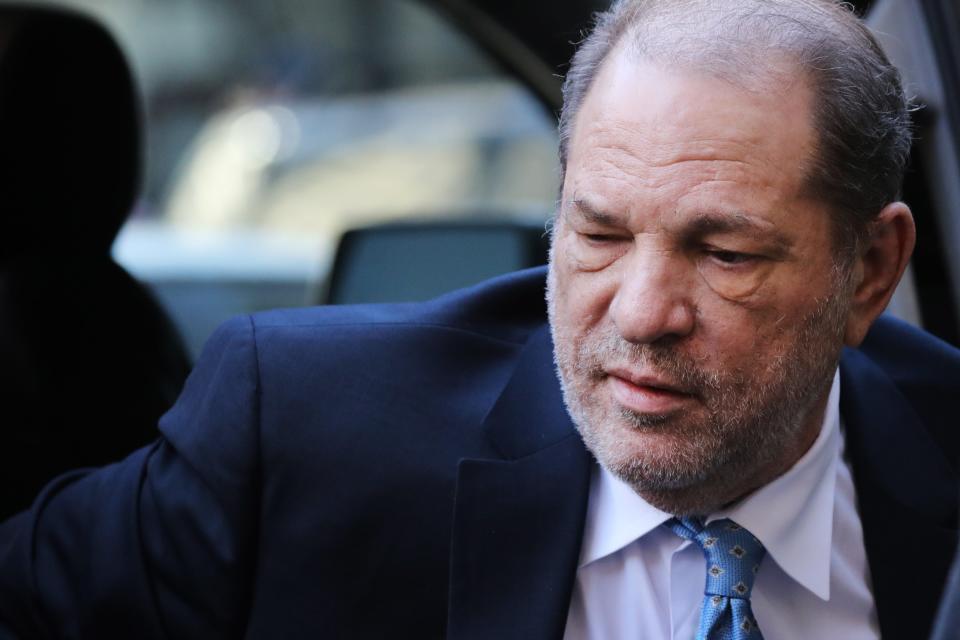Why was Harvey Weinstein case overturned? Sometimes the courts get things wrong.
Americans' phones buzzed Thursday morning with news alerts about a shocking decision in a case that helped fuel the #MeToo movement and changed U.S. history.
A New York Court appeals court overturned film producer Harvey Weinstein's 2020 conviction and 23-year sentence for sexual crimes against three women. The judges ordered a new trial, and Weinstein will remain in prison while serving a 16-year sentence for rape in a separate case.
In its opinion, the appeals court lambasted the trial court for having "erroneously admitted testimony of uncharged, alleged prior sexual acts against persons other than the complainants of the underlying crimes because that testimony served no material non-propensity purpose."
The court's opinion also said Weinstein's case was further prejudiced when he was cross-examined about the witnesses' testimony, which undermined his "right to testify" and bolstered the women's testimony while also portraying him in a "highly prejudicial light."

The decision is an enormous disappointment for advocates and victims of sexual violence. But for lawyers, the ruling is not a major surprise: The stakes were too high for the prosecution and the judge to take such big risks and make such big mistakes.
They should have known better.
Character evidence and the Weinstein case
It may seem logical that, if so many women had stories about Harvey Weinstein's sexual abuse or harassment, then those stories should be heard in a case where he faced charges for the same type of conduct.
But our evidence laws are not always logical. Often, they are policy-based. That is especially true of character evidence.
False rape reports are uncommon: Trevor Bauer accuser may have been a fraud. But most reports of sexual violence are real.
And the New York rules of evidence are clear and specific about when and how evidence of a defendant's character is admissible. Even when character evidence might be permitted under one of the "Molineux" exceptions, which the prosecution tried to use during trial, the court must use discretion to weigh the value of the testimony versus the prejudicial effect it will have on the defendant.
In the common law system, which is based on legal precedent, one court's decision can have far-reaching consequences.
The appellate court made clear that its ruling was based on upholding the foundations of our criminal justice system in the opening paragraphs: "Under our system of justice, the accused has a right to be held to account only for the crime charged and, thus, allegations of prior bad acts may not be admitted against them for the sole purpose of establishing their propensity for criminality. ... It is our solemn duty to diligently guard these rights regardless of the crime charged, the reputation of the accused, or the pressure to convict."
In general, we don't want a court system that convicts people based on testimony about allegations that they haven't been charged with.
It's easy to imagine all the ways that kind of an evidentiary rule could be abused, and it's too great of a risk to take.
The consequences go beyond this courtroom
The main takeaways from the court's decision on Thursday aren't really about Weinstein or even his victims. This decision is much bigger than that.
It's about the importance of following the letter of the law, safeguarding our constitutional right to a fair trial and the right to present a defense, no matter who the accused is or how egregious their alleged crimes are.
No sleepovers: My 8-year-old daughter got her first sleepover invite. There's no way she's going.
Yet, it's also about the chilling effect that this case will have on future victims of sexual violence.
The consequences of what happened in the trial court makes things that much harder for future victims of sexual violence to come forward to authorities.
Opinion alerts: Get columns from your favorite columnists + expert analysis on top issues, delivered straight to your device through the USA TODAY app. Don't have the app? Download it for free from your app store.
If victims have to go through the trauma of reliving their experiences and the stress and massive commitment of a criminal trial, only to have their aggressor's conviction overturned and then be forced either to watch the accused go free or go through the trial process again, then why come forward in the first place?
The rule of law won Thursday. And as much as I am unhappy to see a convicted rapist get a new trial, and as much as I worry about the aftermath for victims of sexual violence, I know that it was the right decision for democracy's sake.
Carli Pierson is a digital editor at USA TODAY and a New York-licensed attorney. She recently finished a legal consultancy with Equality Now, an international feminist organization working to eliminate sexual violence and discrimination against women and girls.
You can read diverse opinions from our Board of Contributors and other writers on the Opinion front page, on Twitter @usatodayopinion and in our daily Opinion newsletter.
This article originally appeared on USA TODAY: Did Weinstein's conviction get overturned? NY court made right call
